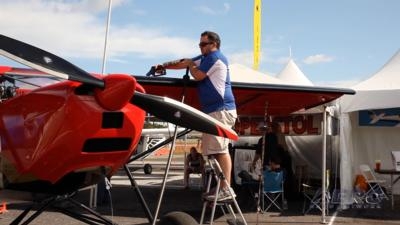Mon, Apr 22, 2024
Inquiry Was Sparked By the University of North Dakota (UND) Aviation Program's Experience
In a significant development impacting piston-engine aircraft operations, Lycoming Engines has released an update on its investigation into valve seat recession observed in engines using UL94 fuel.

The inquiry was sparked by the University of North Dakota (UND) Aviation program's experience after switching its fleet to UL94, a 94-octane unleaded fuel, in June 2023. Despite initial positive outcomes, UND detected abnormal valve seat recession after logging 46,000 flight hours with the new fuel, prompting a return to the traditional 100LL avgas in October.
Lycoming's root cause analysis revealed that while the engine and airframe components meet specifications and are unlikely contributors to the issue, the characteristics of UL94 under certain operational conditions could indeed influence valve seat durability. Key findings suggest that the aromatic concentration in UL94, although not currently regulated by ASTM D7547--the standard specification for hydrocarbon unleaded aviation gasoline--may affect engine valve seats. Higher aromatic levels can alter flame speed and increase particulate abrasiveness, subsequently accelerating valve seat wear.
Responding to these findings, Lycoming is collaborating closely with the FAA to examine how different piston engines respond to variations in fuel aromatics. This partnership aims to refine fuel standards and provide clearer guidelines for aircraft operators on managing fuel use, particularly how leaning techniques could mitigate potential issues associated with high aromatic concentrations.

This investigation is part of Lycoming's commitment under the FAA's Eliminate Aviation Gasoline Lead Emissions (EAGLE) initiative. The project seeks to replace leaded avgas with a high-octane unleaded alternative by 2030, ensuring a safer and more environmentally friendly future for aviation. Through continued research and industry collaboration, Lycoming aims to enhance fuel formulations to prevent mechanical issues and support the aviation sector's transition to unleaded fuels.
More News
He Attempted To Restart The Engine Three Times. On The Third Restart Attempt, He Noticed That Flames Were Coming Out From The Right Wing Near The Fuel Cap Analysis: The pilot repor>[...]
Make Sure You NEVER Miss A New Story From Aero-News Network Do you ever feel like you never see posts from a certain person or page on Facebook or Instagram? Here’s how you c>[...]
From 2009 (YouTube Edition): Leading Air Show Performers Give Their Best Advice for Newcomers On December 6th through December 9th, the Paris Las Vegas Hotel hosted over 1,500 air >[...]
Aero Linx: NASA ASRS ASRS captures confidential reports, analyzes the resulting aviation safety data, and disseminates vital information to the aviation community. The ASRS is an i>[...]
“For our inaugural Pylon Racing Seminar in Roswell, we were thrilled to certify 60 pilots across our six closed-course pylon race classes. Not only did this year’s PRS >[...]
 NTSB Final Report: Rutan Long-EZ
NTSB Final Report: Rutan Long-EZ ANN FAQ: Turn On Post Notifications
ANN FAQ: Turn On Post Notifications Classic Aero-TV: ICAS Perspectives - Advice for New Air Show Performers
Classic Aero-TV: ICAS Perspectives - Advice for New Air Show Performers ANN's Daily Aero-Linx (06.28.25)
ANN's Daily Aero-Linx (06.28.25) Aero-News: Quote of the Day (06.28.25)
Aero-News: Quote of the Day (06.28.25)




